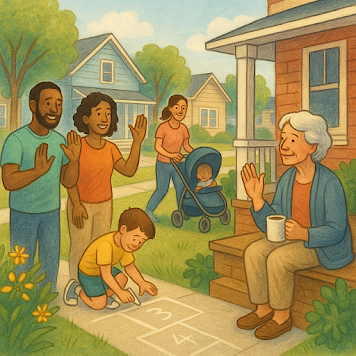Hope on the Front Porch: What New MU Research Means for Our Neighborhoods
If you’ve ever felt a lift from a spontaneous chat at the mailbox or the sight of a child’s chalk art stretching across the sidewalk, you’ve experienced more than a pleasant moment—you’ve tasted hope.
A new six-study project from
University of Missouri psychologists Megan Edwards and Laura King followed
2,300 adults and discovered that hope alone—more than happiness,
gratitude, or excitement—predicted whether people felt their lives were
meaningful.
Why
does that matter for the block where you live? Because meaning isn’t a private
treasure we hoard; it’s social capital that spills over every time neighbors
greet each other, share garden tools, or plan a potluck. The MU team notes that
people who sense meaning enjoy better relationships, stronger physical health,
and even higher incomes. In other words, a hopeful resident is
likely to be a better friend, volunteer, and community problem-solver.
Turning
research into sidewalk practice
The
researchers outline four everyday ways to cultivate hope—each one tailor-made
for neighborhood life:
- Notice
small positives. Instead of scrolling past the world’s bad
news, train your attention on the good within arm’s reach: the teen who
mows an elder’s lawn, the new mural downtown, the fireflies blinking over
backyard fences at dusk. Naming those moments aloud (“Isn’t it great to
see kids playing kickball again?”) spreads hope like dandelion seeds.
- Seize
local opportunities. When life feels uncertain, forward
momentum matters. Host a “driveway dessert” night, start a Little Free
Library, or volunteer for a neighborhood cleanup. Small projects remind us
that progress—even modest progress— is possible and worth pursuing.
- Celebrate
growth in others. The study highlights the power of
recognizing potential. Compliment a neighbor’s fresh coat of paint, cheer
on the novice jogger who’s adding an extra block, or mentor a child
selling lemonade. Every nod to someone else’s progress affirms that
tomorrow can be brighter than today.
- Invest
in nurturing acts. Planting perennials, tutoring after
school, or fostering a rescue pet reinforces the idea that our efforts
bear fruit over time. Hope flourishes when we commit to something that
will outlast the weekend.
Hope
as neighborhood infrastructure
Urban
planners talk about “third places”—those informal gathering spots between work
and home that knit a community together. The new research suggests hope may be
an invisible but equally vital form of infrastructure. A block that runs on
hope is quicker to welcome newcomers, swap babysitting, or rally when a storm
topples trees. Conversely, a deficit of hope breeds isolation, suspicion, and
the brittle feeling that nothing can get better, so why bother?
A
call to hopeful action
Missouri
Good Neighbor Week is only three months away. Imagine if, between now and then,
every household chose one hope-building practice. What if we all jotted daily
“good news” on a chalkboard outside, or invited the quiet family next door for
burgers? According to the MU study, each of those gestures carries a double
payoff: it brightens the giver’s sense of purpose and kindles meaning for
everyone who witnesses it.
Hope, it turns out, isn’t wishful thinking—it’s the spark that lights porchlights, warms conversations, and powers the slow-but-steady revitalization of our streets. The research is clear: when neighbors trade in hope, the whole block banks a richer, more meaningful life.
Further reading
“Hope as a meaningful emotion: Hope, positive affect, and meaning in life” is published in the journal Emotion. Co-authors are Jordan A. Booker and Kevin Cook at Mizzou, and Miao Miao and Yiqun Gan at Peking University in China.
The story from MU on this study can be read online.
Written by David L. Burton
MORE INFORMATION
Take the Engaged Neighbor pledge and become part of a movement! The pledge outlines five categories and 20 principles to guide you toward becoming an engaged neighbor. Sign the pledge at https://nomoregoodneighbors.com. Individuals who take the pledge do get special invitations to future events online and in person. Contact the blog author, David L. Burton via emal at dburton541@yahoo.com.





Comments
Post a Comment